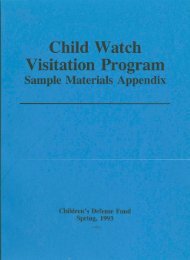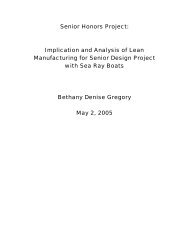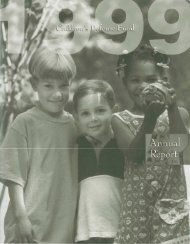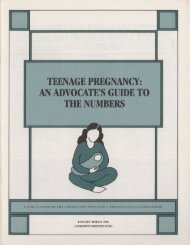children out of school in america - University of Tennessee Digital ...
children out of school in america - University of Tennessee Digital ...
children out of school in america - University of Tennessee Digital ...
Create successful ePaper yourself
Turn your PDF publications into a flip-book with our unique Google optimized e-Paper software.
'promiscuous behavior.'''H The result is that thousands<br />
<strong>of</strong> <strong>children</strong> needlessly are robbed every year<br />
<strong>of</strong> their educational future.<br />
-Alabama's Department <strong>of</strong> Education <strong>school</strong> leaver<br />
report for 1970-71 states that 14 percent <strong>of</strong> the<br />
female drop<strong>out</strong>s cited marriage as the reason; 7<br />
percent cited pregnancy. In 1971-72, 13 percent<br />
cited marriage; 8 percent cited pregnancy. In<br />
Montgomery's <strong>school</strong> leaver report for 1972-73,<br />
52 percent <strong>of</strong> the female drop<strong>out</strong>s cited marriage;<br />
62 percent cited pregnancy.48<br />
-The Super<strong>in</strong>tendent <strong>of</strong> Schools <strong>in</strong> S<strong>out</strong>h Carol<strong>in</strong>a<br />
stated that "Last year there were 7, 107 drop<strong>out</strong>s<br />
<strong>in</strong> our state. Almost 19 percent <strong>of</strong> those drop<strong>out</strong>s<br />
-a total <strong>of</strong> more than 1,30O--cited marriage or<br />
pregnancy as their reason for leav<strong>in</strong>g <strong>school</strong>."49<br />
The reasons most commonly given by <strong>school</strong> <strong>of</strong>ficials<br />
for exclud<strong>in</strong>g pregnant girls are: l) the need<br />
to protect her physical condition (she cannot endure<br />
the "rough and tumble <strong>of</strong> <strong>school</strong>," she will "tire<br />
easily," "there are too many stairs to climb," her<br />
condition will result <strong>in</strong> her be<strong>in</strong>g sick <strong>in</strong> <strong>school</strong>);<br />
2) the need to protect her mental condition ("she<br />
will be ridiculed, scorned, and embarrassed by her<br />
classmates," "she will be a target for gossip," "she<br />
will be happier <strong>in</strong> some alternative program"); 3)<br />
the need to protect other students from the "bad <strong>in</strong>fluence"<br />
<strong>of</strong> a pregnant girl and unwill<strong>in</strong>gness to appear<br />
to condone premarital <strong>in</strong>tercourse ("I have to<br />
th<strong>in</strong>k <strong>of</strong> the other <strong>children</strong>," "we have an obligation<br />
to other <strong>children</strong>-tbey are here for read<strong>in</strong>g and<br />
writ<strong>in</strong>g, not sex education," "we'd get calls from the<br />
other parents and we reflect the feel<strong>in</strong>gs <strong>of</strong> our parents<br />
<strong>in</strong> the community," "I wonder what my child<br />
would see ... she might wonder if it is the accepted<br />
way <strong>of</strong> life"); 4) the need to ma<strong>in</strong>ta<strong>in</strong> an orderly<br />
environment ("tbe class can't function normally,"<br />
47 National School Board Association, School Board Policies<br />
all Pregllallt alldlor Married Studellts, EPS/NSBA Policy<br />
Information Clear<strong>in</strong>ghouse, 1971, p. 1. As far as we were<br />
able to determ<strong>in</strong>e no comprehensive survey <strong>of</strong> district by<br />
district policies has been conducted.<br />
48 "State-Wide School-Leaver Report, Scholastic Year 1970<br />
71, and 1971-72" State <strong>of</strong> Alabama, Department <strong>of</strong> Educalion,<br />
Pupil Personnel Services Section. "Grand Total<br />
School-Leaver Report 1972-73" Montgomery Public<br />
Schools, City and County, Montgomery, Alabama, June 6,<br />
1973.<br />
49 Remarks <strong>of</strong> Cyril Busbee, S<strong>out</strong>h Carol<strong>in</strong>a State Super<strong>in</strong>tendent<br />
<strong>of</strong> Education at a Conference on School-Age Parents,<br />
Carol<strong>in</strong>a Inn, Columbia, S<strong>out</strong>h Carol<strong>in</strong>a, November<br />
20, 1973.<br />
"when girls are 13 they won't do any work if someone<br />
is show<strong>in</strong>g wedd<strong>in</strong>g pictures"); and 5) the<br />
<strong>school</strong>'s lack <strong>of</strong> facilities for day care and flexible<br />
schedul<strong>in</strong>g.<br />
These exclusionary rationales are more the result<br />
<strong>of</strong> arcbaic attitudes and fears than reason. Few will<br />
withstand scrut<strong>in</strong>y. In Ordway v. Hargraves>° the<br />
court accepted expert op<strong>in</strong>ion tbat for the pregnant<br />
pla<strong>in</strong>tiff and her class "the dangers <strong>in</strong> attend<strong>in</strong>g<br />
<strong>school</strong> are no worse for her than for a non-pregnant<br />
girl." Indeed some experts contend that exclud<strong>in</strong>g a<br />
pregnant girl affects her adversely by contribut<strong>in</strong>g to<br />
depression, isolation and possible denial <strong>of</strong> prenatal<br />
medical care and counsel<strong>in</strong>g through fear <strong>of</strong> expos<strong>in</strong>g<br />
her condition. a1 Disruption per se from the presence<br />
<strong>of</strong> a pregnant gjrl <strong>in</strong> <strong>school</strong> is usually more an assumption<br />
than a proven fact. Indeed the American<br />
School Board Journal warns <strong>of</strong>ficials to "th<strong>in</strong>k twice<br />
ab<strong>out</strong> admitt<strong>in</strong>g-much less try<strong>in</strong>g to prove-that<br />
one pregnant gjrl can make a shambles <strong>out</strong> <strong>of</strong> education<br />
<strong>in</strong> their <strong>school</strong> district. "62<br />
One thoughtful policy analyst estimates that onefifth<br />
<strong>of</strong> pregnant <strong>school</strong>-age girls can rema<strong>in</strong> successfully<br />
<strong>in</strong> a regular classroom; that ab<strong>out</strong> three-fifths<br />
are "capable <strong>of</strong> function<strong>in</strong>g as regular students but<br />
have some special needs that must be met if they are<br />
to rema<strong>in</strong> <strong>in</strong> regular <strong>school</strong> dur<strong>in</strong>g pregnancy and<br />
cont<strong>in</strong>ue follow<strong>in</strong>g the birth <strong>of</strong> a baby"; and the<br />
rema<strong>in</strong><strong>in</strong>g one-fifth "may <strong>in</strong>deed be special students<br />
whose circumstances or conditions dictate that they<br />
would be better <strong>of</strong>f <strong>in</strong> special programs more suitable<br />
to their needs."63<br />
Seldom is the girl given a choice, where it exists,<br />
among programs that may be best suited for her<br />
needs. In a Georgia survey dated January 1, 1974,<br />
18 <strong>school</strong> boards reported a policy requir<strong>in</strong>g a<br />
pregnant girl to witbdraw from <strong>school</strong>." In Floyd<br />
County, Kentucky, pregnant girls are eligjble for<br />
homebound <strong>in</strong>struction for only one bour a week.<br />
60 Ordway v. Hargraves, 323 F.Supp. 1155, 1156 (D.Mass.<br />
1971) .<br />
61 See Perry v. Grellada, 300 F.supp. 748 (N.D.Miss. 1969).<br />
62 Ti,e American School Board Journal, Vol. 160, No.3,<br />
March, 1973, p. 24.<br />
58 Marion Howard, A Discussioll <strong>of</strong> State Laws and State<br />
alld Local Policies As They Relate to Education <strong>of</strong> PreglIalll<br />
School-Age Girls, 1972, p. 8.<br />
64 Material Prepared for Council on Maternal Health, State<br />
<strong>of</strong> Georgia by Susan Kampmeier, 1/1/74.<br />
69














